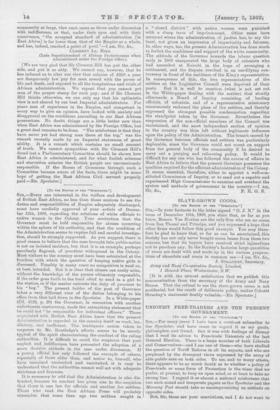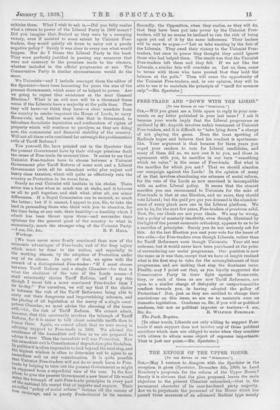UNIONIST FREE-TRADERS AND THE PRESENT GOVERN ME NT.
TO TIM AMOR OF TIM " SVFCTAT071.1
STE,—For many years I hare been a constant enbeeriber to the Spectator, and have come to regard It as my guide, philosopher, and friend. But it was with feelings of dismay that I read its advice to Free-trade Unionists at the last General Election. There is a large number of both Liberals and Conservatives—and I am one of them—who have studied the question of Tariff Reform in all its aspects, and who are perplexed by the divergent views expressed by the array of able public men on both sides. To me, and to many others, there appears to be so much doubt as to whether a policy of Free-trade or some form of Protection is the wiser that we prefer, at present, to keep an open mind, or at least to take to strong line. I regard it as almoit a national misfortune that two such sound and temperate papers as the Speotator and the Morning Post should take so uncompromising an attitude on opposite sides.
But, Sir, those are your convictions, and I do not want to
criticise them. What I wish to ask is,—Did you fully realise what a return to power of the Liberal Party in 1906 meant ?
Did you imagine that, flushed as they were by a sweeping victory, even if assisted to some extent by Unionist Free- traders, they would quietly sit down to carry out a purely negative policy ? Surely it was clear to every one what would
happen. Nor do I blame the Liberal Party in the least. They were perfectly justified in passing any measures that
were not contrary to the promises made to the electors, Whether included in the official programme or not. The Conservative Party in similar circumstances would do the same.
We Unionists—and I include amongst them the editor of the Spectator—have been lamenting for years the sins of the present Government, which some of us helped to power. Are We going to repeat that assistance at the next General Election ? What is an evil now will be a thousand times worse if the Liberals have a majority at the polls then. Then they will have—or think they have—n clear mandate from the country to render impotent the House of Lords, to carry Rome-rule, and, besides much else that is threatened, to introduce Socialistic legislation and confiscation of rights of property which will continue to paralyse, as they are doing now, the commercial and financial stability of the country. Will not all these evils combined far outweigh the problematical evils of Tariff Reform P You yourself, Sir, have pointed out in the Spectator that the present Government have by their old-age pensions dealt the cause of Free-trade its severest blow. It seems to me that Unionist Free-traders have to choose between a Unionist Government plus Tariff Reform of some sort, and a Liberal Government (with all its attendant evils) plus unjust and heavy class taxation, which will quite as effectively ruin the country as Protection in its worst form.
Surely no real Unionist will hesitate in his choice. There never was a time when so much was at stake, and it behoves US all to pull together, and sink what, after all, are minor differences. If a Royal Commission can be secured, so much the better ; but if it cannot, I appeal to you, Sir, to take the lead in persuading those who think with you to abandon, for the time being at any rate, their hostility—a hostility which I admit has been thrust upon them—and surrender their opinions for the general good of the country to what is, numerically, much the stronger wing of the Unionist Party.
—I am, Sir, &o., B. F. HALL. Worksop.
[We were never more firmly convinced than now of the eeonomia advantages of Free-trade, and Of the deep injury Which must be done to the nation, and especially to the working classes, by the adoption of Protection under any of its aliases. In spite of that, we agree with the remark of a distinguished Free-trader : "If I must choose between Tariff Reform and a single Chamber—for that is What the abolition of the veto of' the Lords means—I shall reluctantly choose Tariff Reform, and I say this though I never felt a more convinced Free-trader than I de to-day." For ourselves, we will say that if the choice is between the risk of the Tariff Reformers being able to carry out their dangerous and impoverishing schemes, and the Plaeing of all legislation at the mercy of a single omni- Putent Chamber, we must advise the choosing of the lesser the risk of Tariff rtet"nl.We cannot admit, 1.,siewever, that thie necessarily involves the triumph of Tariff sfurui, for it is easier to talk about scientific tariffs than to lranie them. Again, we cannot admit that we were wrong in atit'isitig support to Free-trade in 190g. We advised the avoidance of the immediate evil then as we are prepared to a,,avise it now. Then the immediate evil was Protection. Now Ise immediate evil Is Constitutional degradation plus Socialism. Politics it is often impossible to look beyond the next step, and t.tilbts highest wisdom is often to determine not to agree to an I mediate evil on any consideration. It is quite possible that Unionist Free-traders will not do so much harm to Free- trade by helping to turn out the present Government as might be plaoesupposed from a superficial view of the case. In the first , to • give the present Government a new lease of life would niean the triumph of anti-Free-trade principles in every part of the tau
onal life except that of imports and exports. Their f eeo
"ailed "policy of social reform" violates ell the canons of exchange, and is purely Protectionist in its essence.
Secondly, the Opposition, when they realise, as they will do, that they have been put into power by the Unionist Free- traders, will by no means be inclined to run the risk of being again put out of it by the same influences. Their leaders will be sure to argue :—" Let us take warning by the fate of the Liberals. They owed their victory to the Unionist Free- traders, but once in power they thought they could ignore those who had helped them. The result was that the Unionist Free-traders left them and they fell. If we act like the Liberals, a similar fate will overtake us. Let us, then, come to terms with those who have proved that they hold the balance at the polls." Then will come the opportunity of the Unionist Free-traders, and, in our opinion, they will be able to use it to maintain the principle of "tariff for revenue only."—En. Spectator.]













































 Previous page
Previous page